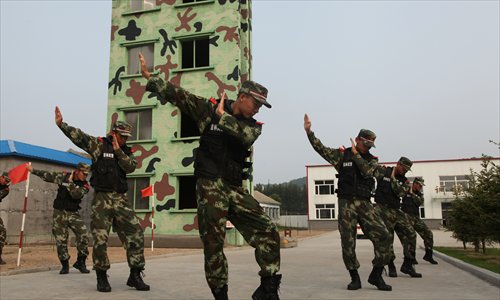HOME >> CHINA
Pop offensive
By Southern Weekly – Global Times Source:Southern Weekly – Global Times Published: 2014-9-23 21:58:01
PLA seeks to win hearts, wars with help from modern music

Soldiers in Jilin, Jilin Province, dance to the viral pop tune "Little Apple" in a relaxation exercise. Photo: CFP
When the Chinese People's Liberation Army (PLA) recruiting officer in Xi'an, Northwest China's Shaanxi Province finally made up his mind to use the catchy pop tune "Little Apple" as the background music for his recruitment video, he did not expect anything would come of it.
"I was worried about whether my superior or the public might think it too much for the military," said the officer, who only gave his family name as Wang.
The video, named "Motherland, here I come," turned out to be the biggest hit the recruitment office had ever produced.
Wang entered the video in a contest on the Ministry of National Defense's website, where it garnered 5.5 million views in just a few days. The video submitted by the neighboring Gansu Province office received only 732.
Much like how South Korean pop star Psy's "Gangnam Style" swept the world in 2012, "Little Apple" is one of China's most popular songs online.
The video features 120 soldiers gyrating to the unassuming tune. It caught fire online, and later won a prize from the defense ministry.
While many Internet users praised the video as "one of the cutest ways to encourage people to join the army," others, like He Qing, an art professor at Zhejiang University, criticized that the music "dumbed down the military."
Sun Yudong, an officer from the PLA Lanzhou Military Area Command, said that in his experience, songs like "Little Apple" help soldiers relax.
"If 'Little Apple' can't be used in the military, the next reasonable question is, where is the military's pop music?" Sun asked.
March to a different drum
Huang Jinyao, an army veteran, said his life was changed by military songs.
Six years ago, Huang was discharged from the army. Just when he had no direction in life, he met another veteran on a train. The two struck up a conversation about military songs. Before they parted, his new buddy told him about a job opening.
Zhang Ziliang, an officer with the Lanzhou Military Area Command, explains that military songs are specifically tailored to bring comfort to soldiers on duty. After being discharged, the songs become an important part of their memories.
"But military songs no longer work on soldiers today," Zhang said.
The same songs that circulated in camps 18 years ago are still being taught today. New additions that reflect the life of today's soldiers are hard to come by.
"Lack of soldier singers could be a reason," said Yu Ge, editor-in-chief of a military magazine.
"Many soldiers are not well educated. Therefore it is hard to find an environment that would help nurture such singers," Yu noted.
Aside from the influence of pop music, the digital age has also accelerated the decline of military music.
Soldiers today are more interested in spending their spare time studying for the IT certification that is crucial to an officer's promotion.
Technology is a strong indicator of an army's strength, something that music cannot compete with.
Ballad battlefield
Ma Weifeng still remembers how his battalion fought "a music war" with soldiers across the Taiwan Straits in the 1980s.
Back when relations between the mainland and Taiwan were still strained, soldiers from Taiwan would blast the ballads of famed chanteuse Teresa Teng on loudspeakers positioned on the Jinmen Islands - located in the Taiwan Straits - to "soften up" PLA soldiers, Ma recalled.
But on the battlefield of music, PLA soldiers are sometimes their own worst enemies, as the political messages authorities aim to convey with military songs sometimes fall on deaf ears.
"Military songs cannot replace pop culture because the latter satisfies emotional and psychological needs," Yu said.
Yu believe that professional songwriters have a hard time composing military music because they possess little understanding of the army.
Fu Lin, a former leader of a military art troupe, says soldiers prefer pop singers like Jay Chou and Leehom Wang. "Aside from sexual or violent content, the army should leave that door open."
Others, like Fang Yong from the Lanzhou Military Area Command, believes that the problem is not with the direction of military music, but that no one is "actually walking this path."
"Whoever or whatever occupies a soldier's personal mp3 player controls the battlefield of military music," Fang said. "It has everything to do with the overall decline of military culture in our society."
PR with a beat
Fu remembers, before the reform and opening-up movement, performances from military art troupes made up a large portion of China's entertainment industry. During that time, popular songs either reflected military life or were sung by military musicians.
Today, not a single military song enjoys that kind of glory.
"It is not only the decline of song, but the decline of military culture," Fu said.
And that decline is also reflected in the growing difficulty in signing new recruits in recent years.
In a play for young recruits, the PLA is pumping out promo videos to attract more young people to serve their country, for which the success of "Little Apple" was an important strategic victory.
People like Luan Kai, a professor at the PLA Institute of Art, are now looking for inspiration in everything from pop music to rock and roll.
"There is power in music. Before soldiers march to the battlefield, we need to give them something that will encourage them to overcome their fears. It's the responsibility of all military artists … Whatever music that serves this purpose is good music," Fu said.